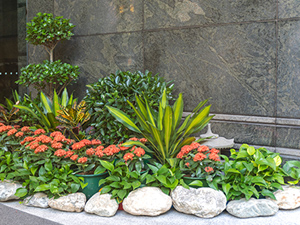
Should damaged dimension stone panels be restored or replaced?
Dimension stone panels are vertically placed, non load-bearing stone slabs, found as an ornamental facing on both building exteriors and interiors, in both new construction and renovation projects. Potential problems with dimension stone panels include chips, cracks, stains, and bowing. This article explains which problems can be resolved by your qualified professional stone restoration technician, and which problems require replacement.
About Dimension Stone Panels
Dimension stone panels are a popular design choices for business centers, corporate headquarters, hotels, educational facilities, hospitals, libraries, government buildings, embassies, airports, churches, and high-end residential properties. Dimension stone panels protect and insulate, but their main purpose is to convey a sense of permanence, stability, and beauty. Because natural stone is a non-manufactured product, it is a very unique and enviable surface material for panels with character. Architects and designers have a wide variety of options with dimension stone, because each slab has its own unique color, grain, veining, and other features. There are also a wide variety of stone finishes include polished, honed, sand blasted, leathered, flamed, and more. Edge options are just as numerous, including straight, smooth, rough split, chiseled, beveled, etc.
Potential Problems
With proper anchoring, most dimension stone is appropriate for interior panels. Although a majority of natural stone restoration services are performed on horizontal applications like floors, countertops, and vanity tops, vertical applications in high-use areas like showers and hallway walls get their share of damage, too, because of exposure to moisture, improper cleaners, or mishaps. Damage may include chips, scratches, dullness, cracks, and stains.
Exterior dimension stone panels are exposed to the elements. Positive and negative pressure from wind, structural settling and concrete contraction (in new construction), freeze and thaw cycles, porosity, and other factors may contribute to damage or even failure. Staining and etching may occur because of environmental pollution. Hard water and mineral deposits from irrigation system overspray can diminish the appearance of dimension stone panels.
One of the most common causes of external panel cracking or failure is thermal hysteresis, where the sun heats the outer layer of stone at a greater degree than the back side. Over time, the stone bows, not only losing its aesthetic appeal, but also posing a dangerous risk if the panels were to fall off. Once a stone panel is bowed, it cannot be restored, and replacement is the only option.
Dimension Stone Panel Alternatives
Modern, lightweight stone panels are comprised of a thin layer of stone reinforced by a fiberglass or aluminum honeycomb backing. Another alternative to dimension stone panels is large-format manufactured porcelain, which can also be reinforced by a honeycomb backing. With these alternative, bowing is not as much of an issue, because the temperature of the material remains more constant throughout, plus the backing material absorbs building stresses that would normally result in damage. Like dimension stone panels, the appearance of lightweight stone panels and large format manufactured porcelain can become diminished for a variety of reasons.
Your stone and tile restoration expert can consult with you about any damage on your dimension stone, lightweight stone, or porcelain panels and advise you on whether problems are cosmetic or structural. Cosmetic damage can most often can be restored with chip and crack repair, honing, polishing, refinishing, stain removal, and in some cases, panel replacement. Structural damage can sometimes be repaired, but is more likely to require complete replacement.
This is one of a series of articles written and published on behalf of Surface Care PRO Partners.
